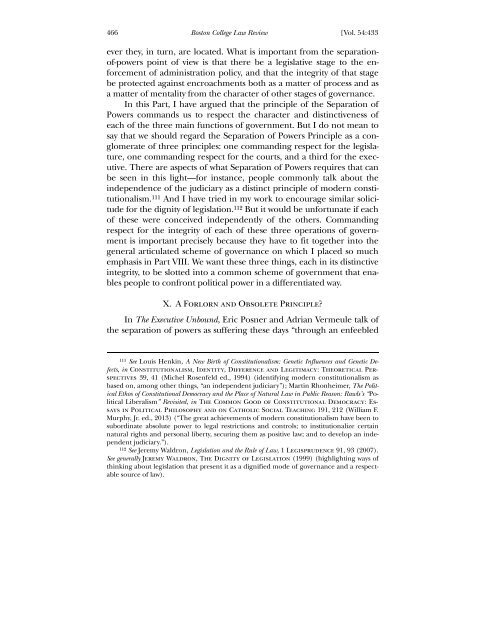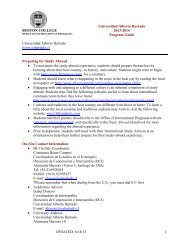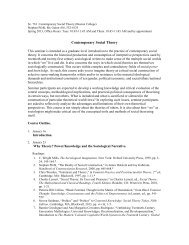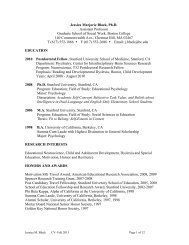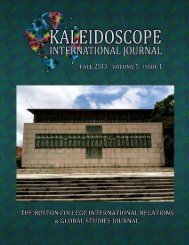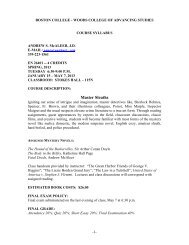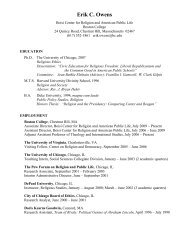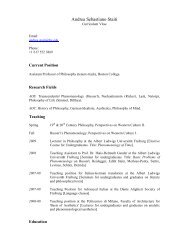separation of powers in thought and practice? - Boston College
separation of powers in thought and practice? - Boston College
separation of powers in thought and practice? - Boston College
You also want an ePaper? Increase the reach of your titles
YUMPU automatically turns print PDFs into web optimized ePapers that Google loves.
466 <strong>Boston</strong> <strong>College</strong> Law Review [Vol. 54:433<br />
ever they, <strong>in</strong> turn, are located. What is important from the <strong>separation</strong><strong>of</strong>-<strong>powers</strong><br />
po<strong>in</strong>t <strong>of</strong> view is that there be a legislative stage to the enforcement<br />
<strong>of</strong> adm<strong>in</strong>istration policy, <strong>and</strong> that the <strong>in</strong>tegrity <strong>of</strong> that stage<br />
be protected aga<strong>in</strong>st encroachments both as a matter <strong>of</strong> process <strong>and</strong> as<br />
a matter <strong>of</strong> mentality from the character <strong>of</strong> other stages <strong>of</strong> governance.<br />
In this Part, I have argued that the pr<strong>in</strong>ciple <strong>of</strong> the Separation <strong>of</strong><br />
Powers comm<strong>and</strong>s us to respect the character <strong>and</strong> dist<strong>in</strong>ctiveness <strong>of</strong><br />
each <strong>of</strong> the three ma<strong>in</strong> functions <strong>of</strong> government. But I do not mean to<br />
say that we should regard the Separation <strong>of</strong> Powers Pr<strong>in</strong>ciple as a conglomerate<br />
<strong>of</strong> three pr<strong>in</strong>ciples: one comm<strong>and</strong><strong>in</strong>g respect for the legislature,<br />
one comm<strong>and</strong><strong>in</strong>g respect for the courts, <strong>and</strong> a third for the executive.<br />
There are aspects <strong>of</strong> what Separation <strong>of</strong> Powers requires that can<br />
be seen <strong>in</strong> this light—for <strong>in</strong>stance, people commonly talk about the<br />
<strong>in</strong>dependence <strong>of</strong> the judiciary as a dist<strong>in</strong>ct pr<strong>in</strong>ciple <strong>of</strong> modern constitutionalism.111<br />
And I have tried <strong>in</strong> my work to encourage similar solicitude<br />
for the dignity <strong>of</strong> legislation.112 But it would be unfortunate if each<br />
<strong>of</strong> these were conceived <strong>in</strong>dependently <strong>of</strong> the others. Comm<strong>and</strong><strong>in</strong>g<br />
respect for the <strong>in</strong>tegrity <strong>of</strong> each <strong>of</strong> these three operations <strong>of</strong> government<br />
is important precisely because they have to fit together <strong>in</strong>to the<br />
general articulated scheme <strong>of</strong> governance on which I placed so much<br />
emphasis <strong>in</strong> Part VIII. We want these three th<strong>in</strong>gs, each <strong>in</strong> its dist<strong>in</strong>ctive<br />
<strong>in</strong>tegrity, to be slotted <strong>in</strong>to a common scheme <strong>of</strong> government that enables<br />
people to confront political power <strong>in</strong> a differentiated way.<br />
X. A Forlorn <strong>and</strong> Obsolete Pr<strong>in</strong>ciple?<br />
In The Executive Unbound, Eric Posner <strong>and</strong> Adrian Vermeule talk <strong>of</strong><br />
the <strong>separation</strong> <strong>of</strong> <strong>powers</strong> as suffer<strong>in</strong>g these days “through an enfeebled<br />
111 See Louis Henk<strong>in</strong>, A New Birth <strong>of</strong> Constitutionalism: Genetic Influences <strong>and</strong> Genetic Defects,<br />
<strong>in</strong> Constitutionalism, Identity, Difference <strong>and</strong> Legitimacy: Theoretical Perspectives<br />
39, 41 (Michel Rosenfeld ed., 1994) (identify<strong>in</strong>g modern constitutionalism as<br />
based on, among other th<strong>in</strong>gs, “an <strong>in</strong>dependent judiciary”); Mart<strong>in</strong> Rhonheimer, The Political<br />
Ethos <strong>of</strong> Constitutional Democracy <strong>and</strong> the Place <strong>of</strong> Natural Law <strong>in</strong> Public Reason: Rawls’s “Political<br />
Liberalism” Revisited, <strong>in</strong> The Common Good <strong>of</strong> Constitutional Democracy: Essays<br />
<strong>in</strong> Political Philosophy <strong>and</strong> on Catholic Social Teach<strong>in</strong>g 191, 212 (William F.<br />
Murphy, Jr. ed., 2013) (“The great achievements <strong>of</strong> modern constitutionalism have been to<br />
subord<strong>in</strong>ate absolute power to legal restrictions <strong>and</strong> controls; to <strong>in</strong>stitutionalize certa<strong>in</strong><br />
natural rights <strong>and</strong> personal liberty, secur<strong>in</strong>g them as positive law; <strong>and</strong> to develop an <strong>in</strong>dependent<br />
judiciary.”).<br />
112 See Jeremy Waldron, Legislation <strong>and</strong> the Rule <strong>of</strong> Law, 1 Legisprudence 91, 93 (2007).<br />
See generally Jeremy Waldron, The Dignity <strong>of</strong> Legislation (1999) (highlight<strong>in</strong>g ways <strong>of</strong><br />
th<strong>in</strong>k<strong>in</strong>g about legislation that present it as a dignified mode <strong>of</strong> governance <strong>and</strong> a respectable<br />
source <strong>of</strong> law).


